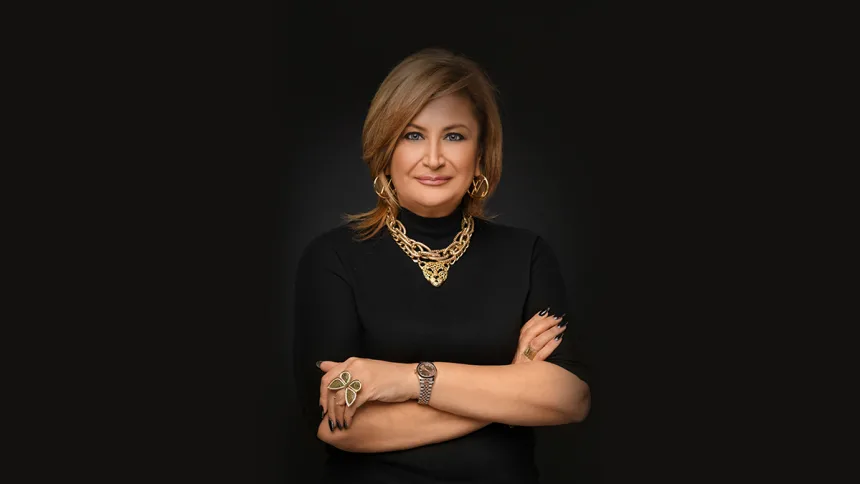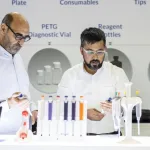Technology breakthroughs, smart investments, and a greater emphasis on accessibility and sustainability are all driving major change in the Arab healthcare industry. The area is encouraging cooperation between the public and commercial sectors while focusing on resolving issues like healthcare inequities, growing expenses, and a lack of workers. Important steps to solve these issues are outlined in the Arab Hospitals Federation’s 2025 Action Plan. In an interview with MedEdge MEA, Alice Yammine Boueiz, CEO of the Arab Hospitals Federation, offered her perspectives.
MedEdge MEA: How do you assess the key opportunities and challenges in Arab healthcare systems?
Alice Yammine Boueiz: Like healthcare systems worldwide, the Arab healthcare sector is undergoing a profound transformation, standing at a pivotal crossroads that blends immense opportunities with significant challenges.
On the opportunities side, the region is witnessing unprecedented investment in healthcare, driven by ambitious reforms in countries such as Saudi Arabia, the UAE, and Egypt. These investments span critical areas like digital health, artificial intelligence, telemedicine, virtual care, and sustainability. By prioritizing innovation, governments and private stakeholders are enhancing accessibility, improving patient outcomes, and optimizing operational efficiency. Such transformative initiatives are not only modernizing healthcare delivery but also positioning the region as a leader in global healthcare innovation.
However, the sector faces considerable challenges. Persistent disparities in access to high-quality care exist both across countries and within individual nations, reflecting inequalities that require urgent attention. Rising healthcare costs, driven by advanced treatments, modern technologies, and expensive medications, further strain resources. Workforce shortages, including the migration of skilled professionals, compound the issue, threatening the sustainability of healthcare systems.
Despite these challenges, the Arab healthcare sector is demonstrating resilience and adaptability. Both public and private stakeholders are actively fostering collaboration, leveraging advancements, and aligning efforts to overcome obstacles. By transforming challenges into opportunities, the sector is building a comprehensive, sustainable, and inclusive healthcare ecosystem that meets the needs of diverse populations.
ME: How can collaboration between healthcare sectors improve healthcare delivery in the region?
Alice: Collaboration between the public and private sectors in healthcare is not just important; it is a cornerstone for achieving transformative progress, especially in times of unprecedented challenges. By fostering deep partnerships, we can integrate resources, expertise, and cutting-edge solutions to address systemic flaws and the disparities that persist in healthcare systems.
At the Arab Hospitals Federation, we are leading the way in facilitating such collaboration through a variety of initiatives and programs designed to create environments where stakeholders can share best practices, confront pressing challenges, and co-create innovative solutions.
ME: What are the key goals of the 2025 AHF Action Plan for Arab healthcare?
Alice: As a reputable body, the Arab Hospitals Federation (AHF), alongside its team of experts, is proud to launch a highly innovative Action Plan for the year 2025. This plan focuses on five key pillars that aim to revolutionize the healthcare landscape across the Arab world.
The first pillar is Leadership Development, which aims to empower healthcare leaders through specialized programs and high-profile events. To achieve this, we are set to launch the Healthcare Executive Leaders Program (HELP), designed to drive innovation and transformation within the sector. In addition, we will organize four major events in Riyadh, Dubai, Cairo, and Bahrain, bringing together influential leaders and stakeholders to foster growth, exchange ideas, and advance the healthcare sector across the region.
The second pillar, Digital Transformation, emphasizes the adoption of cutting-edge technologies such as artificial intelligence (AI), telemedicine, and digital health platforms. This will enhance accessibility and improve patient care across the region. As part of this effort, we are rolling out the PrecisionCare Project, which aims to establish standards for healthcare facilities that embrace technological advancements in precision medicine. Additionally, we are pioneering the “Hospitals Without Walls” concept, which pushes the boundaries of care delivery by expanding beyond traditional hospital settings.
The third pillar, Sustainability and Climate Resilience, focuses on promoting eco-friendly practices and preparing healthcare systems to adapt to climate-related challenges. Through the Arab Healthcare Sustainability Center (AHS Center), in collaboration with the World Health Organization (WHO), we aim to equip healthcare facilities with the knowledge and tools they need to reduce their environmental impact and improve climate resilience.
The fourth pillar, Mental Health Integration, addresses the growing demand for mental health services by embedding these services into primary healthcare systems. This effort is further strengthened through the AMHA Project (Alliance for Mental Health and Addiction), which focuses on integrating mental health services into community-based care models while working to reduce the stigma associated with mental health issues.
Also Read : ‘Let’s Make it Historic Together’ -Alice Yammine Boueiz
The fifth pillar, Health Equity and Accessibility, ensures that all communities—regardless of location, socioeconomic status, or background—receive high-quality healthcare. This initiative seeks to close gaps in care, offering equitable healthcare solutions that cater to the diverse populations within the region, ensuring no one is left behind.
These pillars represent the AHF’s unwavering commitment to fostering a sustainable, inclusive, and innovative healthcare ecosystem across the Arab world.
ME: In your view, which trends will define healthcare by 2025?
Alice: By 2025, several transformative trends are expected to define the healthcare landscape, both in patient care and the overall structure of healthcare systems. Key trends in this sector will include the integration of digital transformation and artificial intelligence, which will enhance efficiency and accuracy in diagnosis, treatment, and management. Telemedicine and remote care will continue to expand, providing greater access to healthcare and reducing barriers to treatment. Personalized and precision medicine will revolutionize healthcare by tailoring treatments based on individuals’ genetic makeup, improving outcomes and minimizing side effects. Sustainability in healthcare and climate resilience will become central to healthcare planning, ensuring that systems are environmentally responsible and adaptable to future climate challenges. Furthermore, the integration of mental health services into mainstream healthcare will help address the growing demand and reduce stigma, making mental health care as accessible and prioritized as physical health and well-being. Data-driven decision-making will enable healthcare providers to deliver more informed and effective care, helping optimize resources and outcomes.



















